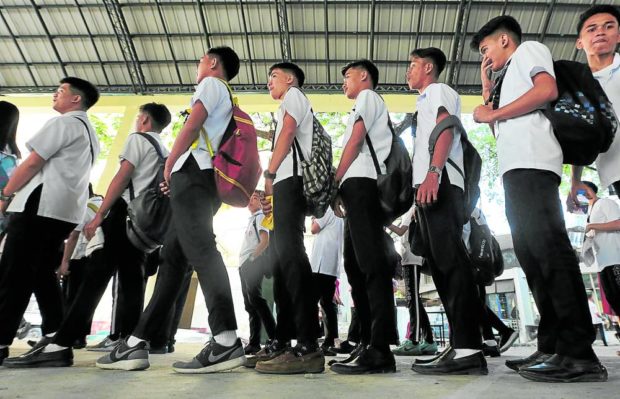Hire more K-12 grads, DTI chief urges companies

READY FOR A JOB? Junior high school students rehearse for their “moving up” program at Manila’s Araullo High School in this March 21, 2018, file photo. A study published in 2020 showed that over 20 percent of senior high school graduates had entered the country’s workforce while more than 70 percent opted to continue their studies. —GRIG C. MONTEGRANDE
MANILA, Philippines — Promised quick employment upon graduation, senior high school (SHS) students who finished the K-12 program are now flooding the job market but face less-than-bright prospects, as employers in the country still prefer applicants with undergraduate degrees.
On Wednesday night, Trade Secretary Alfredo Pascual said he wished to change that, as he urged companies to rethink their hiring policies that favored college graduates and to employ more K-12 finishers.
Interviewed on dzMM radio, Pascual said the K-12 education system provided enough training for its graduates to become “fully functioning employees.”
“When the K-12 was created, its purpose was to produce [holistically developed Filipinos]. Meaning, if you are a K-12 graduate, assuming it was implemented well, you are OK, you are ready for a job,” the trade secretary said in Filipino.
But the prevailing impression of many people, including employers, that noncollege graduates are not prepared for the working world is wrong, according to Pascual.
“The mindset today is that you are not well-formed in preparing for a livelihood or in your life if you do not have a college degree, which is totally an erroneous mindset,” he said.
Pascual called on employers to review their hiring policies and consider removing tertiary education as a requirement for certain entry-level jobs.
Reached for comment, the Employers Confederation of the Philippines (Ecop) said it was open to the idea but reasoned that there were other factors at play in hiring people and determining their employability.
“The problem is that in a situation where there are a limited number of jobs, those who are college graduates have more advantage. That’s the reality,” Ecop president Sergio Ortiz-Luis Jr. told the Inquirer.
“Also, if you will pay them the same level of salary, then why choose someone who is not a college graduate?” the Ecop official said.
2 added grades
Still, Ortiz-Luis said the trade secretary’s call was understandable, but in the end the decision on who to hire and for what reasons still rested solely on individual companies.
Introduced in 2013, the K-12, or kindergarten to Grade 12, education system was made possible with the passage of Republic Act No. 10533, or the “Enhanced Basic Education Act of 2013.”
It added Grades 11 and 12 as the SHS stage of the enhanced 13-year basic education system. Previously, there were six grades of elementary school after kindergarten, and four years of high school.
Before its implementation, the Philippines was the sole country in Asia, and among only three in the world, along with Angola and Djibouti, with a 10-year basic education curriculum.
In 2018, the graduation year of the first batch of SHS students, a study by the advocacy group Philippine Business for Education (PBED) found that the cohort possessed “theoretically” 93 percent of competencies suitable to the needs of the nation’s industries, such as critical thinking and problem-solving skills.
But a separate PBED study said only about 20 percent of 70 of the country’s leading companies across all sectors were inclined to hire senior high graduates.
According to PBED, many companies accept only job applicants with at least two years of college education, excluding SHS graduates from consideration.
This hiring policy explains the discrepancy between the graduates’ supposedly high competency and their low chances of getting a job, PBED said.
Briones assurance
In March 2018, then Education Secretary Leonor Briones assured employers that the first batch of K-12 program graduates were competent and ready to land jobs.
She said SHS finishers, especially those who took the technical-vocational (tech-voc) track, need not worry about lack of job opportunities should they decide to work after graduation, as the business, manufacturing and commercial sectors were keen to try their skills.
Briones also explained that work immersion or on-the-job training was part of the graduation requirements for all SHS students. Its aim is to provide them the skills they will need as they become part of the labor force.
The Department of Education (DepEd) chief clarified that while the training did not guarantee jobs, it would give graduates a better chance to be employed right away.
70% continued studies
At the same press conference, Education Undersecretary Jess Mateo cited as example the close to 90 percent of the tech-voc students who had undergone the modeling program since 2013 and eventually got employed, while 10 percent pursued higher or further learning.
A study by the Philippine Institute for Development Studies published in 2020 confirmed the results of an earlier study that only a small proportion, or a little over 20 percent, of SHS graduates entered the labor force and more than 70 percent opted to continue their education.
The study validated earlier findings that employers were maintaining a wait-and-see attitude toward hiring SHS graduates. —WITH A REPORT FROM INQUIRER RESEARCH
RELATED STORY:
DTI chief urged businesses to hire more K-12 graduates
Subscribe to INQUIRER PLUS to get access to The Philippine Daily Inquirer & other 70+ titles, share up to 5 gadgets, listen to the news, download as early as 4am & share articles on social media. Call 896 6000.